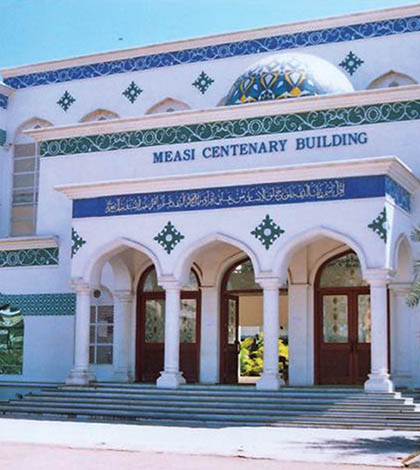
 Established 113 years ago, the MEASI Association is among the oldest groups of minority educational institutions in southern India. The management institute set up under its ambit is a standalone, co-educational Muslim minority institution that emphasises on practical applications suited to the Indian environment
Established 113 years ago, the MEASI Association is among the oldest groups of minority educational institutions in southern India. The management institute set up under its ambit is a standalone, co-educational Muslim minority institution that emphasises on practical applications suited to the Indian environment
With the objective of imparting training in different disciplines of management with an emphasis on practical applications suited to the Indian environment, the MEASI Institute of Management was established in the year 1987 by the parent body Muslim Educational Association of Southern India (MEASI). The association, established 113 years ago, was registered under the Act XXVI of 1860 and is one of the oldest minority groups of educational institutions in South India.
The genesis for the college’s establishment was a clarion call given by Sir Syed Ahmed Khan in 1886, the father of Muslim education in India. As a result, in December 1901, MEASI was established with Justice Hungerford Tudor Boddam as its founder president. This was followed by the setting up of the New College in 1951. This college today also houses the Measi Institute of Management, Measi Academy of Architecture, Measi Institute of Information Technology, MEASI CA Academy, Measi Matriculation Higher Secondary School and Measi College of Education.
With a clear focus on developing world-class management students, the MBA programme conducted by the MEA- SI Institute of Management (MIM) manages to attract the maximum number of students. The course has been approved by the All India Council for Technical Education (AICTE) and is affiliated to the University of Madras. Faculty strength at the institute is 16 and student intake has also been rising at a steady pace with each passing batch. In a positive, the admission process at the institute gives priority to female students.
The educational condition of minority communities in India has been a well-known fact for a number of years. Despite the country having set up several institutes to help the cause, there are large gaps that still remain. A major drawback here is that minority institutions are not aware of various facilities that are offered by the central government. While this may be a generic problem, continual improvement is among one of the challenges of the management at MEA- SI both while setting up and operating the institute and the university.
Student Intake
2010-2012 90
2011-2013 120
2012-2014 120
Girls and Boys Ratio
Year Ratio Total Strength
2013-14 103:17 120
2012-13 112:8 120
2011-12 82:8 90
However, the institute is taking strides towards making its management students future-ready, with many already placed in good, lucrative jobs both in the corporate and government sectors. A major reason for this success has been the industry interface that the stu- dents are provided with by the institute. The MIM has done projects with MNCs/ TNCs in this regard and, as part of the curriculum, students also make visits to various industries for first-hand information on recent developments in the industrial sectors. The institute also has a counselling cell managed by the faculty from different departments.
Looking ahead, MIM is also trying to bring in some international perspective and opportunities for its students by part- nering with foreign universities. This, with the collaboration of the institute with other domestic central universities, could bring MEASI closer to their objective of educating and creating an ecosystem for minority communities to learn and excel in their respective fields.

















